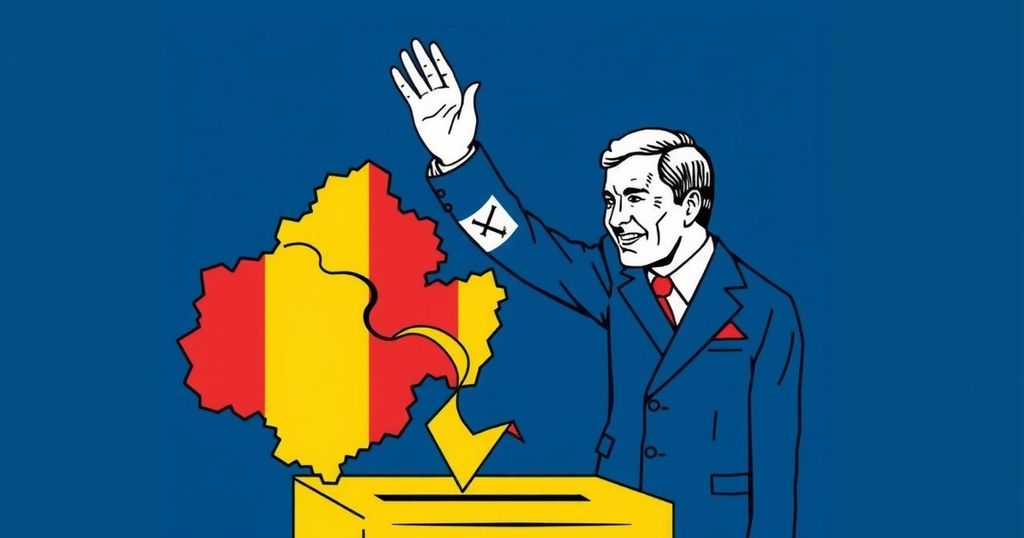The Stakes of Moldova’s Presidential Election: A Battle Against Russian Influence

The second round of Moldova’s presidential election could determine the country’s future direction between European integration and Russian influence. Incumbent President Maia Sandu faces Alexandr Stoianoglo, with allegations of Kremlin-linked vote-buying complicating the electoral dynamic. Concerns over democratic integrity and foreign interference shape this crucial vote, which has significant implications for Moldova and the region.
Moldovans are heading to the polls for a pivotal second round in a presidential election that could significantly influence the nation’s alignment, deciding between a pro-European trajectory or a return to Russian influence. Maia Sandu, the incumbent president known for her pro-Western stance, is seeking reelection after advancing Moldova’s relations with the European Union amid the backdrop of the Ukraine war. In the initial voting round, Sandu secured 42% of the vote, while Alexandr Stoianoglo, a challenger from the pro-Russian Party of Socialists, garnered over 26%, having polled below 10% prior to the election. The election, however, has been overshadowed by allegations of Kremlin-affiliated vote-buying, which Sandu characterized as an unprecedented attack on democratic integrity. This strategic interference, allegedly orchestrated by Russian financier Ilan Shor, aims to manipulate the electoral outcome in favor of a Russia-aligned candidate. Analysts emphasize the potential repercussions of this involvement, warning that the electoral process could siphon off genuine democratic representation if corrupt finances influence the results. Sandu and her opponent face a highly polarized electorate, exacerbated by persistent crises during her presidency, including the Covid-19 pandemic and an energy crisis linked to Russian supplies. Critics argue that Sandu’s decision to hold an EU membership referendum concurrently with the presidential election backfired, generating more dissent than anticipated. Stoianoglo’s campaign attempts to balance pro-European aspirations with a conciliatory approach toward Moscow, leading to a complex platform that confounds clarity of vision among voters. With increasing concerns over Russian incursions in Moldova, particularly in the breakaway region of Transnistria, the stakes of this election extend far beyond national politics, holding implications for regional stability amid rising tensions with Russia. As the election approaches, the possibility of external meddling looms large, with fears that a victory for Stoianoglo could dismantle Moldova’s democratic structures, serve as a conduit for Russian expansionism, and further complicate the geopolitical chessboard in Eastern Europe.
The political landscape in Moldova is fraught with tension as the country navigates its post-Soviet identity between Western integration and Russian influence. The pivotal presidential election is taking place against the backdrop of Russia’s aggressive posture in Ukraine, compounding fears of foreign meddling in domestic affairs. Throughout her term, President Maia Sandu has prioritized European alignment, yet the challenges she faced—including energy crises and the pandemic—have created vulnerabilities that her opponents seek to exploit. The shadow of Russian financial influence, particularly through oligarchic structures like that of Ilan Shor, serves not only to embolden pro-Russian factions but threatens the integrity of democratic processes in Moldova as a whole.
The upcoming presidential election in Moldova serves as a critical juncture for the nation, poised between potential European integration and a reversion to Russian influence. With allegations of foreign interference casting doubts on the electoral integrity, the outcome will decisively impact Moldova’s future direction and the stability of the region. A victory for Sandu could reinforce pro-European sentiment, while a win for Stoianoglo may signal a troubling shift towards authoritarianism and further Russian entrenchment, with long-lasting consequences for Moldovan democracy and regional geopolitics.
Original Source: www.cnn.com








